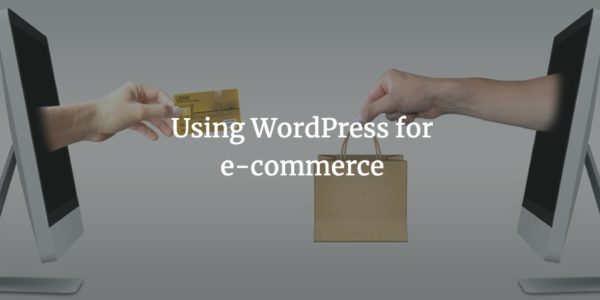E-commerce has opened plenty of new opportunities for thousands of entrepreneurs today. Over the last few years, the e-commerce market has witnessed significant growth as more and more consumers prefer online shopping.
As per Statista, over 1.8 billion consumers around the world bought things online in 2018. To make the most of e-commerce growth, most small businesses are starting their online store to reach more customers. And why not, e-commerce platforms like WordPress, Magento etc. have made it very easier and simpler.
More than one-third of the websites today are build on WordPress. For e-commerce, the WordPress provides an innovative plugin called WooCommerce. This plugin is also open source like WordPress, and can be used for free.
However, one question that has always risen among the e-commerce businesses—is WordPress good for e-commerce? Is it better than other e-commerce platforms?
To clear the doubts and answer these questions, we have listed both the pros and cons of using WordPress for e-commerce. Let’s begin with the pros.
Advantages of using WordPress for e-commerce
1. Free and easy to use
Currently, WordPress is the most popular content management system (CMS) because of its simple and quick installation process. Its WooCommerce plugin allows conversion of a website into an e-commerce store without any technical expertise.
If users need any help during installation, the platform provides an installation wizard for it. Furthermore, it is available for free.
2. Customization
WooCommerce plugin allows users to customize the storefront as per their requirement, without putting much time and effort into it. Even the themes can also be personalized to give the storefront a desired look and feel.
The product attributes can be edited and changed, and other plugins can also be used to integrate more functionalities.
3. Easier management of products and inventory
The webstore created using WooCommerce can be used to sell both digital and physical products or services. Users can add new products regularly, categorize these products, and manage things easily.
For smoother inventory management, the platform comes with a user-friendly user interface (UI). This UI can be used to keep a track of stocks and management of regular inventory.
4. Support for multiple currencies and payment gateways
WooCommerce provides geolocation support to allow retailers accept multiple currencies. The support for multiple payment gateways and shipping options helps in attracting customers from various locations and countries. The customers can pay in their suitable currency and tax rate. This can accelerate the sales for online retailers.
5. Web analytics
Whether it is running a blog or an e-commerce store, the analytics is critical to analyze the performance of website, which products are being visited and sold, what’s driving traffic, and what’s not right.
For that, the WooCommerce facilitates use of an extension called WooCommerce Google Analytics. This extension can be used to not only track the basic user activity, but also the events, sessions, and important data like product views and actions on shopping cart.
6. SEO-friendly
WordPress is good for search engine optimization (SEO) as it provides extensions and plugins like Yoast SEO. This helps you to improve your rankings on Google and other search engines by providing relevant suggestions. This way, you can improve the SEO on your own.
Disadvantages of using WordPress for e-commerce
1. Limited support for e-commerce issues
Since users have to install WooCommerce to start the e-commerce store, the support for plugin is not as good as for the platform itself. If they get stuck or the things go wrong with the storefront, there will be a need to approach third-parties or experienced WordPress developers to get things fixed.
2. Theme should be compatible with WooCommerce plugin
There are hundreds of free and premium themes available on WordPress repository that can be easily downloaded and installed on the site in no time. However, if the WooCommerce is used to design the store, then the used theme should support the plugin.
Hence, the website owners need to hunt for the right e-commerce theme for WordPress that is reliable and trustworthy. Otherwise, the site might crash and cause errors.
3. Security issues
When it comes to security and data privacy, usershave to rethink and redefine their strategy to ensure that everything remains safe. Because of WordPress’s popularity, the cybercriminals are targeting the platform increasingly.
They keep on finding the flaws in WordPress to hack the websites on this platform. That is the reason WordPress releases updates on a regular basis. The WordPress plugins also get updates to avoid such issues.
The thing here is that you will need to check regularly if any updates are available for WordPress, plugins, as well as themes. If the things are not updated, the site remains somehow vulnerable.
4. Limited functionalities for big e-commerce stores
While WordPress allows customization of several features and things, but still there is a room for a lot of things to be improved. Big e-commerce stores sometimes need advanced or specific features which can’t be added. It’s because the WordPress API puts some limitations even for the developers.
5. Untrustworthy themes and plugins
Online retailers can’t afford to risk the data and security of their stores. To ensure that they are using the secure and high-quality themes, they have to use the themes and plugins from the reliable and well-known sources only.
While there are numerous themes and plugins available for free, not all of them are trustworthy. The free and cheap themes and plugins don’t really provide support if the issues arise. These products have to be used very carefully.
Wrapping up:
If you are looking to use WordPress for your e-commerce business, then it’s essential that you consider both the pros and cons of doing it. If you think you can handle the limitations effectively, then WordPress is good for you. But if you can’t manage the security, plugins, and themes on your own, then it’s better to think again.
Let us know if you have any query.






